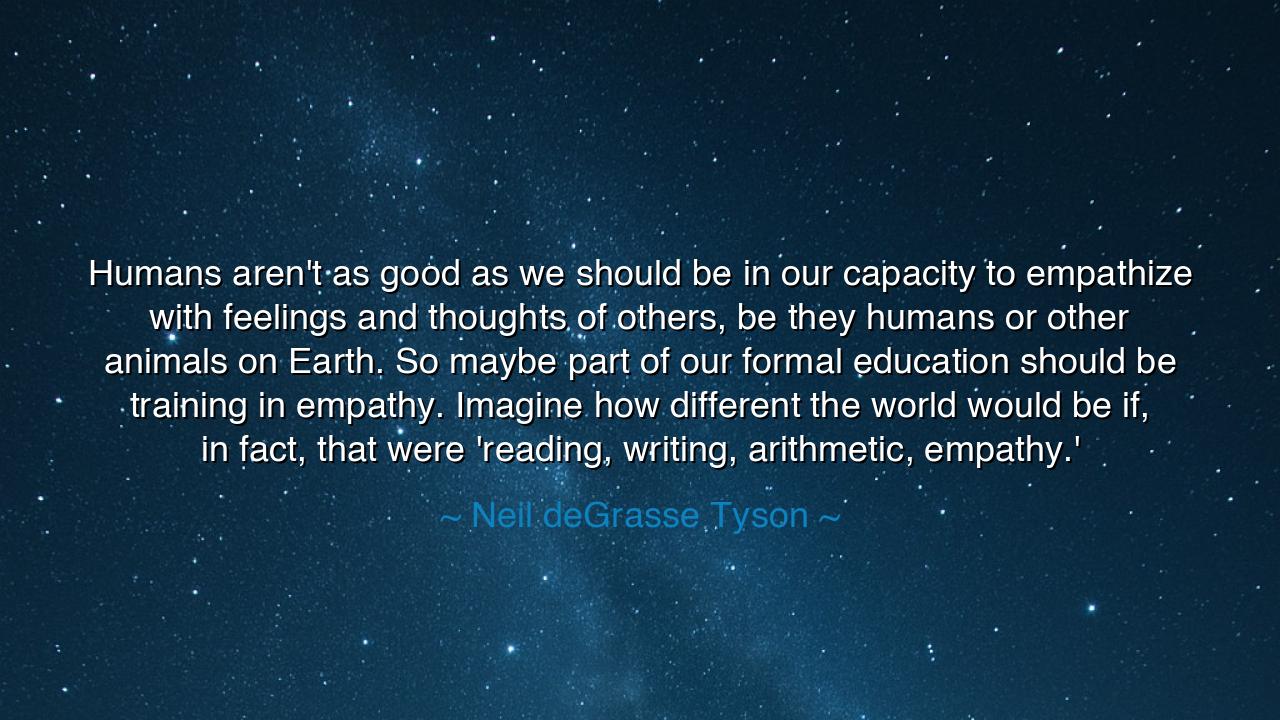
Humans aren't as good as we should be in our capacity to
Humans aren't as good as we should be in our capacity to empathize with feelings and thoughts of others, be they humans or other animals on Earth. So maybe part of our formal education should be training in empathy. Imagine how different the world would be if, in fact, that were 'reading, writing, arithmetic, empathy.'






Hear, O seekers of wisdom, the words of Neil deGrasse Tyson, who gazes upon the stars yet speaks also to the human heart: “Humans aren't as good as we should be in our capacity to empathize with feelings and thoughts of others, be they humans or other animals on Earth. So maybe part of our formal education should be training in empathy. Imagine how different the world would be if, in fact, that were ‘reading, writing, arithmetic, empathy.’” In this vision, the scientist calls us not merely to knowledge of the heavens, but to harmony upon the earth. He speaks to the deepest lack of our age: that men and women can master numbers and machines, yet fail to master the simple act of seeing the world through another’s eyes.
What is empathy, if not the bridge between souls? It is the sacred art of feeling the sorrow of the stranger, the joy of the friend, the fear of the weak, the hope of the oppressed. To live without it is to be blind though one’s eyes are open, to be deaf though one’s ears hear the cry. Tyson laments that while schools teach us to calculate, to read, to write, they neglect to cultivate the deeper wisdom: the ability to share in the heartbeat of another being. Without empathy, knowledge becomes cold, progress becomes cruel, and civilization becomes a shell without a soul.
Consider the tale of Mahatma Gandhi, who wielded no sword and commanded no armies, yet moved an empire by his capacity for empathy. He felt the suffering of the poor, the humiliation of the colonized, the hunger of the oppressed, and made their pain his own. His weapon was not hatred, but understanding. His power was not in numbers, but in the way he awakened conscience across the world. His life became living proof that to train the heart in empathy is to wield a force greater than violence, stronger than oppression, and more enduring than fear.
Nor is empathy only the guardian of humanity; it is the bond that connects us with all living creatures. The prophet Isaiah once spoke of a day when the lion would lie down with the lamb, but in our own time we see cruelty visited upon the innocent beasts of the earth, slaughtered or neglected because man has failed to feel their silent suffering. Tyson reminds us that empathy must extend beyond the human circle, for we share this earth with other beings who breathe, who hunger, who feel pain and joy as we do. Without such care, we betray not only them but the wholeness of creation.
Imagine, then, a world where every child learned empathy as surely as they learned letters and numbers. Where classrooms trained not only the intellect but the heart. Where alongside multiplication tables, children practiced compassion; where alongside essays, they practiced listening; where alongside history, they practiced kindness. Such a world would be less quick to war, less eager to exploit, more willing to heal, more capable of justice. For knowledge without empathy is a tool, but knowledge with empathy is wisdom.
Beware, however, the peril of neglect. The history of mankind is littered with tyrants who were clever but without compassion, rulers who built empires but left deserts of suffering behind them. Their education sharpened their minds but left their hearts barren. Such is the fate of a civilization that trains for power but not for empathy. Without this sacred quality, man becomes less than beast, for beasts kill to live, but men without empathy kill for pride, for greed, for nothing at all.
Therefore, O children of the future, let this be your lesson: cultivate empathy as diligently as you cultivate knowledge. When you read, read not only with the eyes but with the heart. When you listen, listen not only to the words but to the unspoken cry beneath them. When you act, consider not only your gain but the wound or healing it may bring to another. Let schools teach it, let homes model it, let each soul practice it daily, until empathy is no longer rare but the common tongue of humanity.
For the true measure of greatness is not in what one knows, nor in what one builds, but in how one loves and understands. Knowledge raises towers, but empathy raises civilizations. So let your education be not complete until it has trained your heart as well as your mind. In this way, you will fulfill the vision of Tyson, and more than that, you will bring the world closer to its highest destiny: a place where wisdom and compassion walk hand in hand, and where the light of understanding shines brighter than the stars themselves.






AAdministratorAdministrator
Welcome, honored guests. Please leave a comment, we will respond soon